Resilience – Positive Ways of Building Resilience in Youngsters

Resilience
Resilience represents overall adaptability and coping
Importance of Resilience
- Essential for human thriving
- An ability necessary for the development of healthy adaptable young people
- Helps/Enables children to emerge from challenging experiences with a Positive sense of themselves and their future.
- Enable them to face disappointment
- Learn from failures
- Cope with loss
- Adapt to change
Resilience is part of the COMPASS ADVANTAGE(To build positive youth development)
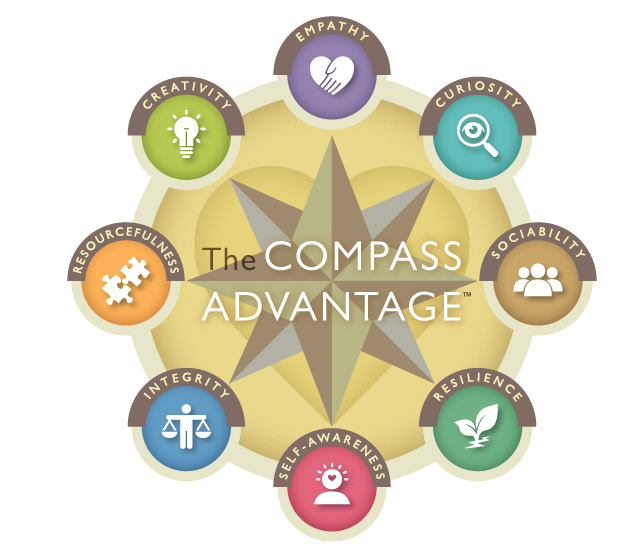
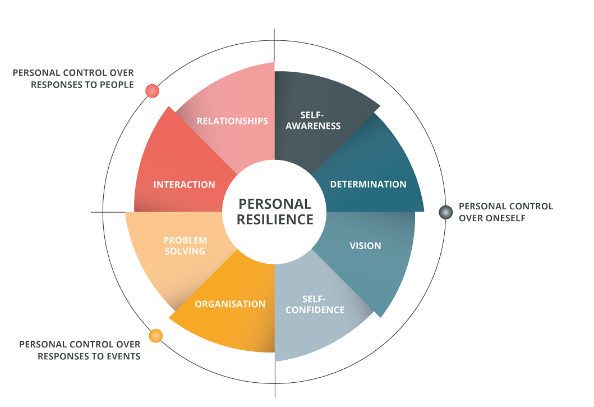
The ability to meet and overcome challenges in ways that maintain/promote well-being plays an essential role in how students learn to achieve academic and personal goals.
RESILIENT YOUNG PEOPLE FEEL:
- Sense of control over their future.
- They know they can reach out to others for support when needed.
- Readily take initiative to solve problems.

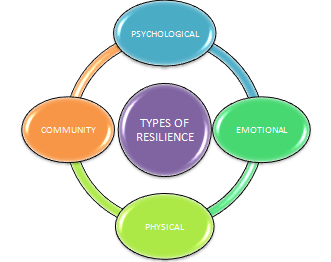
- PSYCHOLOGICAL RESILIENCE-“Mental Fortitude” ability to mentally withstand/adapt to uncertainty, challenges and adversity.
- People who exhibit psychological resilience develop
- Coping Strategies
- Capabilities to remain calm and focused during crisis
- EMOTIONAL RESLIENCE- cope emotionally with stress and adversity. How a person respond to stress and adversity triggers a flood of emotions.
- Emotionally resilient people understand
- What they are feeling & why?
- Realistic and optimistic
- Pro-active in using internal & external resources which results in managing emotions in a healthy and positive way.
- PHYSICAL RESILIENCE- Body’s ability to adapt to challenges- Maintain stamina & strength, recover quickly & Efficiently.
- Physical resilience can be maintained by having:
- Healthy lifestyle choices
- Building connections
- Making time to rest and recover
- Deep breathing
- Engaging in enjoyable activities.
SOCIAL SUPPORT, ADAPTIVE COPING SKILLS & Ability to tap on one’s INNER STRENGTHS can help develop and strengthen resilience in an individual.


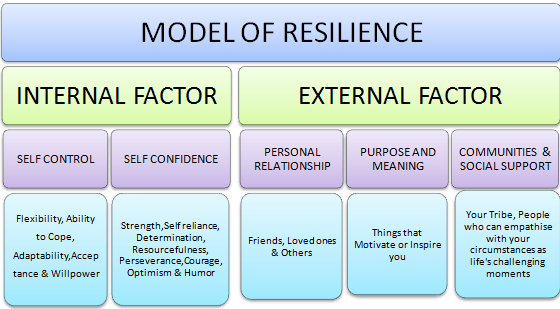
RESILIENCE TRAINING
Resilience can be learned
- Reframe Negative thoughts
- It’s not about avoiding obstacles/resisting change. It’s about utilizing flexibility to reframe thought pattern and learn to tap into strength based approach to working through obstacles.
HOW TO BUILD AND CULTIVATE RESILIENCE
- Develop Self Awareness-Understanding how you typically respond to stress and adversity
This include
- Understanding your strengths and
- Knowing your weaknesses
- Build Self Regulation-Remaining focused in the time of stress and adversity is important but not easy
- Stress Reduction technique-
- Guided imagery
- Breathing Exercises
- Mindfulness training
- Learn Coping Skills- helps in dealing with stressful and challenging situations
- Coping skills include-
- Journaling
- Reframing thoughts
- Exercising
- Spending time outdoors
- Socializing
- Improving sleep hygiene
- Tapping into creative outlets
- Increase Optimism-optimistic people tend to feel more in control of their outcomes
- To Build Optimism-
- Focus on what you can do when faced with a challenge
- Identify positive problem solving steps that you can take.
- Strengthen Connections- support system plays vital role in resilience
- This includes-
- Bolster your existing social connection
- Find opportunities to build new ones
- Know your Strengths- people feel more capable and confident when they can identify and draw on their talents and strengths.
THE CHARACTERISTCS OF RESILIENT PEOPLE
- Locus of Control-focus on how you as opposed to external forces can control the outcomes of events.
- Social Support- rely on family, friends when needed.
- Problem Solving Skills- identify ways within your control to work and resolve a problem.
- Optimism- when the going gets tough, believe in your ability to handle it.
- Coping Skills- find techniques to reduce stress and anxiety.
- Self Care- Make your mental, emotional & physical health top priority.
- Self Awareness- Know your strengths, weaknesses and how to put internal resources to work.
ESSENTIAL SKILLS FOR YOUNG PEOPLE TO HANDLE SITUATIONS EFFECTIVELY
7C’S MODEL-Specifically Addresses Resilience building in Kids and Teens
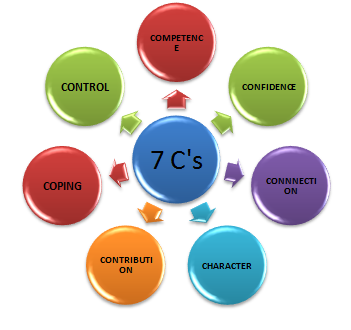
THE AMERICAN PSYCHOLOGICAL ASSOCIATION (APA) LISTS 10 TIPS FOR BUILDING RESILIENE IN YOUNG PEOPLE
- Foster Social Connection
- Help children by having them help others
- Maintain a daily routine
- Take breaks from sources of stress
- Teach Self-care
- Set realistic goals
- Nurture a positive self image
- Keep things in perspective
- Encourage Self discovery
- Accept change as part of life